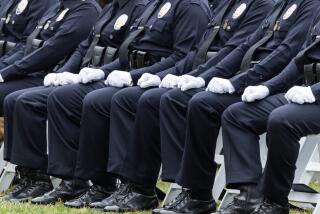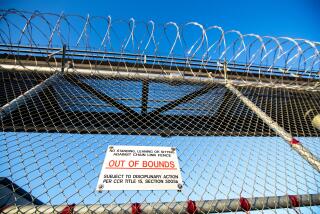U.S. Court Asked to Allow More Extensive Security Checks of Gays
- Share via
SAN FRANCISCO — A federal appeals court was asked Friday to allow the government to make more extensive investigations of homosexuals than others seeking security clearances for civilian jobs involving secret defense information.
“The United States has a compelling interest in protecting vital national security information,” Jay S. Bybee, a lawyer for the Justice Department, told a three-judge panel of the U.S. 9th Circuit Court of Appeals. “We’re entitled to assure ourselves that anyone the KGB has targeted will be able to resist its overtures.”
The panel heard arguments in one of several closely watched legal tests around the country of the rights of homosexuals in defense, intelligence and military posts.
Bybee asked the court to overturn an August, 1987, ruling by a federal district judge here that a Defense Department policy calling for closer background investigations of homosexuals was unconstitutional. Gay groups hailed the decision as a landmark ruling, noting that there were an estimated 1,000 homosexuals in defense-related jobs in the nation.
Insufficient Proof
In a 46-page decision, U.S. District Judge Thelton E. Henderson said the government had failed to provide sufficient proof that homosexuals were more subject to blackmail or coercion than other applicants for security clearances. The policy, he said, reflected “irrational prejudice and outmoded stereotypes and notions” about gays and lesbians.
The judge held that homosexuals, as a group, were entitled to “heightened scrutiny” by the courts to make sure that their rights were not violated. In this instance, he said, the department’s policy infringed on the rights to free expression and equal protection of the law.
Lawyers for High Tech Gays, a group that brought a class-action suit challenging the government’s policy, urged the appellate panel to uphold Henderson’s ruling, saying the extended investigations often resulted in long delays in security clearances that effectively prevented gays from obtaining jobs.
“Gay people are being subject to discrimination . . . simply because they are gay,” said Richard Gayer, a San Francisco attorney. “Everybody else gets a security clearance in two months--but for gays, it takes nine months.”
Security Matter
Matthew A. Coles, a lawyer for the American Civil Liberties Union of Northern California, argued that it was unfair to single out homosexuals as greater security risks.
“The way it works now, all gays are subject to an expanded investigation--but for heterosexuals, this occurs only when there is some additional adverse information,” Coles said.
Under Defense Department procedures, applicants for secret and top-secret clearances for civilian jobs must complete questionnaires and then undergo background investigations. If adverse information arises, an expanded inquiry is made to substantiate or disprove the information.
According to the government, information about heterosexual relations between consenting adults is not investigated unless there is also an indication an applicant has committed a criminal act, engaged in irresponsible conduct or appears otherwise susceptible to coercion and blackmail. But any indication of homosexual activity is subject to investigation in itself.
In the hearing before the appeals panel, Bybee defended the policy as a legitimate means of protecting national security, contending that foreign agents would seek to exploit a job holder’s homosexuality through coercion or blackmail, just as they would drug-addiction or marital infidelity.
“The KGB targets homosexuals because they are homosexuals,” he said.
Gayer disputed the suggestion that homosexuals were more susceptible to mental or emotional instability or to blackmail and coercion.
“The KGB doesn’t simply go after gays as a class, it goes after people with access to classified information,” he said.
While there has been a flurry of legal activity on the issue in recent years, many questions about the rights of homosexuals to hold sensitive jobs have yet to be resolved by the courts.
Two years ago, the U.S. Supreme Court, upholding an anti-sodomy law in Georgia, ruled that there was no broad constitutional right to engage in homosexual activity.
Contest Dismissal
Last June, the high court held that a homosexual employee was entitled to a court hearing to contest his dismissal from the Central Intelligence Agency. But earlier this month, the justices upheld the National Security Agency’s dismissal without a hearing of an employee who had a series of homosexual encounters in foreign countries.
Currently under review before the federal appeals court here is the case of Perry Watkins, a former Army sergeant who was barred from re-enlisting under regulations prohibiting homosexuals in the military.
A three-judge panel, in the first ruling of its kind, held last February that the regulations violated the right to equal protection. The decision is being reviewed by an 11-member panel of the Court of Appeals.
More to Read
Sign up for Essential California
The most important California stories and recommendations in your inbox every morning.
You may occasionally receive promotional content from the Los Angeles Times.










